- Home
- Madeleine L'engle
Camilla Page 11
Camilla Read online
Page 11
“Oh, my God,” my mother said. “Oh, my God.”
“Would it make you any happier if I tramped up and down and twisted my face around in agony?” my father asked my mother. “There’s nothing to do now but wait and see; and I don’t happen to feel that the outward show of anxiety will help matters.”
“If you really cared I wouldn’t mind,” my mother said. “If you were trying to be calm for my sake. But you aren’t worried. You just don’t care if Tod and Mama . . . it wouldn’t matter to you if there’s been some terrible accident.”
“Aren’t you being a little hysterical, Rose?” my father asked. “There are any number of things that may have detained them.”
But my mother shook her head. “No, no. You’ve always been that way. You never worry about anything. You always say, Oh, it will be all right. When Mama had pneumonia you weren’t worried, you didn’t care.”
Very carefully my father poured himself another cocktail; then he said slowly, “Is it because you think I don’t like your mother, that men aren’t supposed to like their mothers-in-law, that you’re talking like this? I assure you that you’re wrong. I’m closer to your mother than I ever was to my own.”
“No, no,” my mother said again. “It isn’t just Mama. It’s everything. When Camilla had measles last winter and her temperature went to a hundred and six you didn’t worry You just said that she was having the best of care and that all children had to go through— And you didn’t worry about me when she was born. Mama said you just sat there reading a book all those hours—all those hours I was in such terrible pain and danger.”
“You weren’t in any more pain or danger than any other woman who’s had a child,” my father said. “Camilla was a perfectly normal delivery without complications.”
And my mother cried in great fury, “I can’t bear it! I can’t bear it! How could any woman bear to live with—to have to see every single day a man who has no feelings—completely callous—”
My father put his glass down on the arm of his chair and walked off the porch and my mother sat there in the rocking chair breathing quickly and rocking back and forth, not crying, but trembling with anger.
I stood in the doorway until Binny called me. “Camilla! Have you said good night to your mother and father?”
Then I went out on the porch and my mother stopped rocking with those little vicious jerks and pulled me up onto her lap and I lay back against her and the flies were buzzing up against the screens, and in the trees the birds were still calling. My mother bent over me and kissed me on my head and cheeks and the back of my neck and then she pushed me off her lap and said, “Run along upstairs to bed now, baby. I’ll send Grandmother up to you when she comes.”
I went upstairs and Binny put me in bed and pulled down the green shades and kissed me good night and shut the door; but I could not sleep. The last deep yellow rays of the setting sun came in around the blinds and fell in golden shafts on the floor and I lay there in bed and I thought, Grandmother and Uncle Tod have had a terrible accident. Something dreadful has happened.
I kept thinking this and being frightened, until at last I fell asleep. I was awakened by voices and laughter and I got quickly out of bed and ran to the window. And there in the driveway was Uncle Tod’s long, low, open car; and spilling out of it were Grandmother and all the Wildings, Uncle Tod and Aunt Marge and the three kids, Podge and Toddy and Tim, and Aunt Jen with her arms full of packages. And Mother was flinging her arms around Grandmother’s neck, and crying, “Oh, Mama, what happened, what happened— we were almost frantic, we—Marjorie, Jenny, children, I’m glad to see you—oh, Mama, we thought something had happened to you and Tod—that there’d been an accident or something!”
“Well, if you will talk on the telephone all day long so no one can reach you,” my grandmother said.
“But we haven’t used the telephone all day!” my mother cried. “Only when Rafferty called your house to see if you might be still—and there wasn’t any answer so we knew you’d left. But that was the only time we used the— Are you sure you called?”
“Am I in the habit of saying I’ve done things when I haven’t, Rose?” my grandmother asked.
My father said to my grandmother, “We’re on a party line, you know. It was probably someone else on the line talking whenever you called. The people down the road use the phone for hours at a time.”
“But long-distance, wouldn’t you think they’d do something about long-distance!” my mother cried, her voice still frantic in the evening air rising up to my room.
Uncle Tod put his arm around her and said, “We’re all here, safe and sound. Aren’t you going to ask us in for dinner? Now don’t worry about food because we’ve brought a ham, all cooked, and the trunk of the car is piled with things from the garden, and a turkey, too, and you can see that Jen is loaded down with practically the entire A and P.”
“Oh, come in, come in,” my mother cried, flinging her arms open wide. “Oh, my darlings, I’m so glad to see you all. And you can stay for a whole week! All of you? Oh, that will be so—and Camilla will adore having the children to play with.”
“Where’s Camilla, where’s Camilla?” the children were dinning as they all pushed open the door and went into the house. I ran downstairs then, shouting, “Hello, hello, hello!” with Binny running after me, holding out my slippers.
Aunt Marjorie picked me up and gave me a hug. “Oh, she doesn’t need slippers on a warm night like this, do you, elf?” And all the children were dancing up and down and I begged, “May I stay down and eat with you, please, may I?”
My mother said, “What do you think, Raff? Do you think it’s all right?”
My father said, “It’s entirely up to you, Rose. If you’re going to worry about her being up so late by all means send her back upstairs. We’ve had enough worrying for one day.” His voice was low and cold and I could see that he was still very angry with her for the things she’d said to him earlier that evening.
“For the Lord’s sake, of course she can stay,” Uncle Tod said. “She’s a fine, healthy child. Does children good to get off their schedules once in a while. Have two more, Rose, and you won’t worry about Camilla nearly as much.”
Podge, the oldest of my cousins, said, “Let her stay, please, Aunt Rose. I’ll take care of her.”
Aunt Jen said, “She can have a long nap tomorrow afternoon.”
Somehow all the suitcases got upstairs and the turkey on ice and everybody distributed around the different rooms. My room was a great big room and had two beds, and two folding cots were put up, and I was terribly excited because I was going to sleep in the same room with my wonderful cousins, Podge and Toddy and Tim.
Then we were all downstairs again and Podge and Toddy were busy passing plates with crackers and cheese, and I realized that my father was more than just angry with my mother. He sat on the arm of Aunt Jen’s chair and talked and laughed with her and spoke to my mother only when she asked him a direct question, and then he answered it as briefly as possible.
We sat down to dinner and the table in the dining room had all the leaves put in. Aunt Jen sat at my father’s right and again he directed all his conversation and all his laughter to her, and she laughed and talked up at him and her eyes were very shiny and it was as though the two of them were in a separate circle of candlelight and everybody else was in the cold and shadow outside. When I looked at my mother at the other end of the table she looked very white and she was talking much too quickly and making jokes and laughing and she did not eat a thing.
After dinner we children were sent to bed. Toddy and Tim fell asleep right away but I couldn’t sleep and I heard Podge moving about in the bed next to me so I whispered, “Podge.”
And she whispered back, “Can’t you sleep?”
“No.”
She whispered, “Let’s tiptoe downstairs to the landing and sit there and watch. We often do that at home. It’s fun.”
So we crept downstairs a
nd sat on the landing. We could see the hall very clearly and we could see through the double doors into the living room. They were all sitting around and talking, but after a while my father and Aunt Jen came out into the hall, and Podge nudged me to be very still. My father had his arm about Aunt Jen’s waist, and he was looking down at her and smiling and again it seemed that they were in their own separate warm circle of candlelight. They just stood there, my father looking down at Aunt Jen and Aunt Jen looking up at him, and then they went back slowly into the living room again, but my father kept his arm about Aunt Jen.
Podge whispered to me, “I heard my mother tell my father once that Aunt Jen loved your father and always would.” I didn’t say anything and after a while Podge whispered, “Gosh, Camilla, but your mother’s beautiful. She’s like all the princesses in the fairy tales. Aunt Jen isn’t anywhere near as pretty as Aunt Rose.”
No, I knew that. You would not even know that Aunt Jen and my mother were sisters. Aunt Jen was small and had short curly brown hair and the manner of an interested little sparrow. She was always doing nice things for other people and everybody loved her; but I never caught anybody looking at her the way people have looked at my mother.
Then my mother came out into the hall and just stood there, and after a moment my father came out after her, and said in a low voice, “Well, what do you want?”
My mother said, soft and trembling, “All I want is love and affection, and you don’t seem to be able to give me that.”
My father still sounded drawn away and angry as he answered, “I told you before I married you that I wasn’t demonstrative.”
My mother gave a funny little laugh that was somehow terribly forlorn. “I didn’t think anybody could carry it to the extremes that you do.”
“Well, there it is,” my father said.
“You were being affectionate enough with Jen this evening.” My mother’s voice was low.
“Jen doesn’t demand affection,” my father said. “It’s a lot easier to give it when it isn’t clamored for.”
“Anyhow, do you think it’s fair to Jen?” my mother asked. “The way you’ve been behaving with her this evening? Quite aside from whether or not it’s fair to me?”
“That’s up to me to decide.” My father made a movement as though to go back to the living room, but my mother stopped him.
“Perhaps if you feel that way about it we should separate,” my mother said.
My father’s voice sounded cold and indifferent as he answered, “Perhaps we should.”
Then into my mother’s eyes came a look of shocked terror, of wild animal panic. She drew in her breath sharply. “A little love seems such a small thing to ask,” she whispered.
“I’m sorry,” my father said.
“Do you think you could love Jen?” my mother asked. “I mean the way I want to be loved?” There was horrible fear in her voice.
“I don’t think so,” my father said, and he sounded still cold and dull; he turned away from my mother and went back to the living room. My mother fell against the wall and stood leaning there in her white dress, beautiful as a despairing angel. She stood there supported by the wall and she did not cry.
Podge took my hand and then we slipped back upstairs. Podge never said anything about what we had heard, and neither did I. Indeed, until the time that Uncle Tod moved out West, Podge and I were always awkward and shy together, and I wonder if the eavesdropping was why. The rest of the week the Wildings were with us that summer in Maine, they all played and swam and ate huge meals on the extended dining-room table and it seemed as though Podge and I must have dreamed the bad things that happened, because my mother and father seemed happy and not as though they had said those terrible things to each other.
But I knew it had not been a dream.
Aunt Jen got married and went to Birmingham, Alabama, to live; and after Grandmother died Uncle Tod moved out to California and we hear from them mostly just at Christmas and birthdays.
So there were the two memories and I would have given anything in the world if I could have kept them hidden where they had been for so many years, deep, deep, back in my mind. For now Father was different in my feelings too. Now Father, like Mother, was no longer just my father. He was Rafferty Dickinson, as complete and separate a person as Camilla Dickinson. When I, on that faraway time of my birthday, woke up to the fact that I was Camilla Dickinson, I hadn’t waked up to the fact that my parents weren’t created especially for me, that they were separate people, too, as separate as the people across the court; and it had taken me all this time to realize it and the realization was a deep aching pain. It is a much more upsetting thing to realize that your parents are human beings than it is to realize that you are one yourself. I lay on the bottom bunk of Luisa’s bed and it seemed as though a heavy weight were pressing down upon my chest and slowly crushing my heart.
Then in the living room I heard Mona saying, “And what about Frank? Don’t you even care that he spends half his time with those cheap Italian girls?”
“What about the Dickinson child?” Bill asked in a bored voice. “I thought she was the new one.”
“That spoiled little snit? I’m not sure I don’t prefer the Italians. At least they’re human.”
Luisa looked up from her pad and said deliberately, “Frank went over to Pompilia Riccioli’s for lunch. He’ll probably stay for supper too. He usually does.”
Lying there on her bed, I felt, Oh, no! Life is too difficult, too terrible; how can anybody endure it? And I turned my face to the wall.
“I’m sorry,” Luisa said then. “I’m sorry, Camilla. I shouldn’t have told you that.”
“I don’t care,” I said.
“And don’t mind about Mona. She doesn’t mean it. Truly.”
“I don’t care,” I said again. What difference did it make? What difference did it make what Mona thought, or Bill, or Luisa, or anybody? I lay staring up at the slats and I was filled with a fear of Pompilia Riccioli, of the little Italian girls who were at least human. I was filled with a fear of love because of what it had done to my mother and father, of what it had done to Mona and Bill; and the fear seeped through my entire body until I was waterlogged with it, like a piece of driftwood on the beach after a storm.
In the living room Mona screamed suddenly. “Oh, damn the war! Damn it! It’s been over for years, why can’t it be over! Frank spends half his time with that horrible legless creature over on Perry Street and the only time you act human is when you’re telling somebody about what you did in the South Pacific. You’re not in the South Pacific now. You’re in New York. Why can’t you forget it? It’s over! Why can’t you leave it alone?”
“Why can’t you leave me alone?” Bill asked.
Luisa banged her pad down on her desk. “Let’s get out of here,” she said. “Let’s take Oscar for a walk or go to a movie or something.”
“I can’t,” I said.
“Why not?”
I didn’t want to answer but I said finally, “I’m supposed to see Frank this afternoon.”
“Oh, you are? You’re a dope if you let yourself be at Frank’s beck and call, did you know that, Camilla Dickinson? No man wants any girl he can have as easily as all that.”
“I can’t help it,” I said.
“Aw, come on, Camilla,” Luisa urged. “Let’s go. Keep him waiting for a few minutes. It’ll do him good.”
“No, I can’t,” I said. “I can’t.”
“You make me sick,” Luisa said. “You make me so sick I could vomit.”
Then the front door banged and I heard Frank’s footsteps and he walked through the living room without speaking to Mona and Bill and came and stood in the doorway to Luisa’s room. “Hi.”
“Hi,” I said.
“What are you doing home?” Luisa asked rudely. “I thought you were out for the day.”
“Nope. Got a date with Camilla.”
“Camilla’s busy.”
“No, I’m not,” I
said.
Luisa turned on me. “You said you were going to spend the day with me.”
I shook my head. “I said I’d come down first thing this morning and I did. I’ve spent the whole morning with you.”
“A fat lot I think of anyone who breaks promises,” Luisa said.
“I didn’t break any promise. I said I’d come and I did.”
“I don’t mean that,” Luisa said scornfully, “and you know it. Don’t try playing dumb, Camilla Dickinson. You didn’t tell me about Jacques or yesterday afternoon or anything.”
“I never promised I’d tell you,” I said.
Luisa grew white as she always did when she was angry. “Mona said you were a spoiled little snit who wasn’t even human, and she’s right. Go on out with Frank if you want to. Do anything you like with him, only don’t ever expect my help about anything ever again. As for you, Frank Rowan, I’m surprised to see you rushing about being so social, today of all days.”
Although Frank was standing still, when Luisa spoke these words he seemed to give the effect of suddenly stopping. “What do you mean?”
“Don’t you know?” Luisa asked, and there was a really nasty grin on her face.
Frank seemed to grow stiller and stiller. “It would be a good idea if you would shut up,” he said.
“As a psychiatrist I was just curious to see how you’d be,” Luisa said, “but I can’t say it’s seemed to bother you any.”
Then Frank broke away and grabbed me by the arm. “Come on, Camilla,” he said, “let’s get out of here.” He dragged me from the apartment. When we got out on the street we stopped to catch our breaths and Frank said, quite calmly, as though there had not been this enormous Thing between him and Luisa just a few moments before, “I should think Mona and Bill provide enough scenes so Luisa wouldn’t want to add to them.” Still holding my arm, he started walking rapidly up the street, and I walked along beside him and we said nothing until he led me into a drugstore.

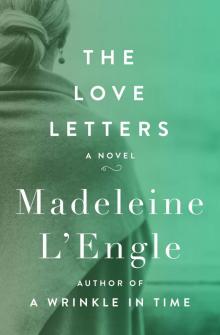 Love Letters
Love Letters The Summer of the Great-Grandmother
The Summer of the Great-Grandmother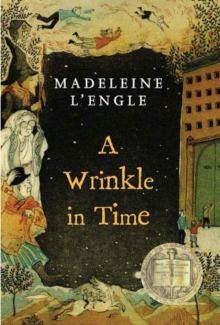 A Wrinkle in Time
A Wrinkle in Time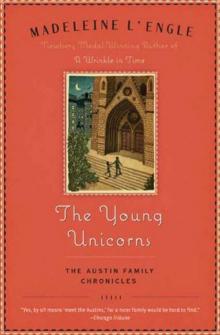 The Young Unicorns
The Young Unicorns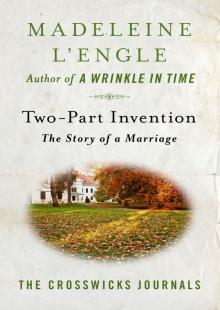 Two-Part Invention: The Story of a Marriage
Two-Part Invention: The Story of a Marriage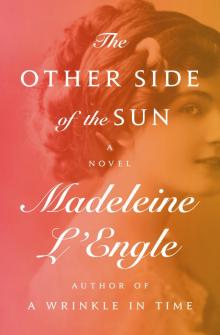 The Other Side of the Sun
The Other Side of the Sun A House Like a Lotus
A House Like a Lotus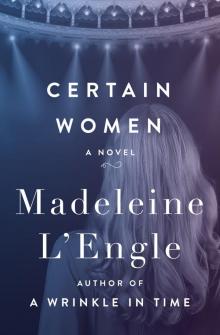 Certain Women
Certain Women Many Waters
Many Waters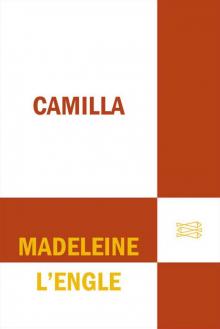 Camilla
Camilla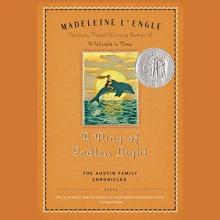 A Ring of Endless Light
A Ring of Endless Light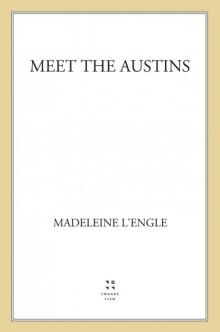 Meet the Austins
Meet the Austins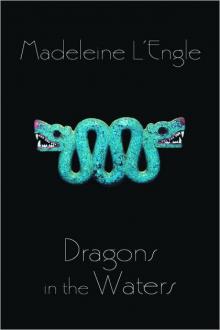 Dragons in the Waters
Dragons in the Waters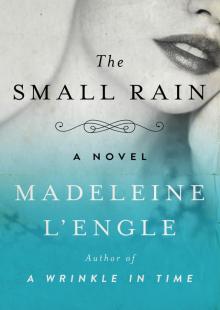 The Small Rain
The Small Rain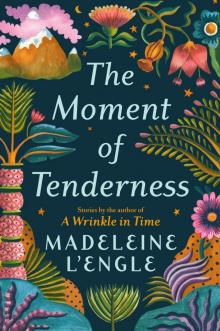 The Moment of Tenderness
The Moment of Tenderness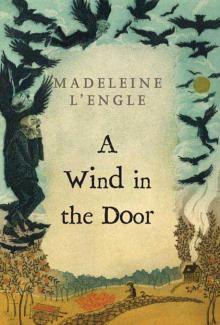 A Wind in the Door
A Wind in the Door Miracle on 10th Street
Miracle on 10th Street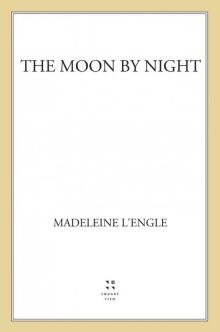 The Moon by Night
The Moon by Night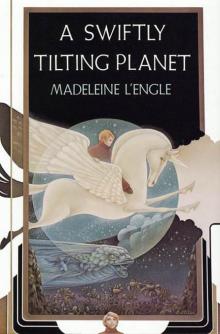 A Swiftly Tilting Planet
A Swiftly Tilting Planet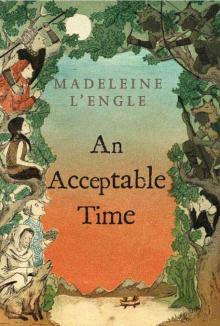 An Acceptable Time
An Acceptable Time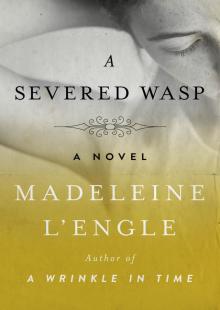 A Severed Wasp
A Severed Wasp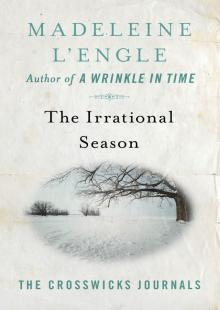 The Irrational Season
The Irrational Season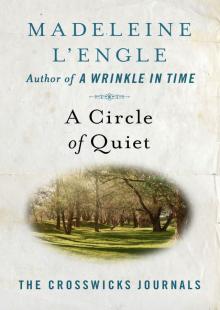 A Circle of Quiet
A Circle of Quiet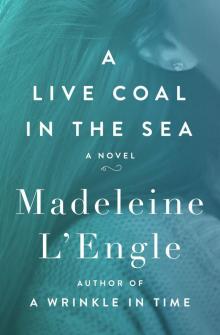 A Live Coal in the Sea
A Live Coal in the Sea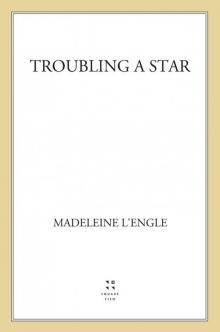 Troubling a Star
Troubling a Star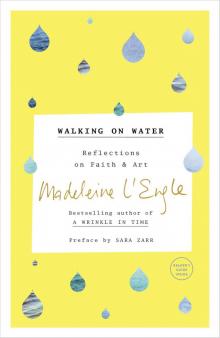 Walking on Water: Reflections on Faith and Art
Walking on Water: Reflections on Faith and Art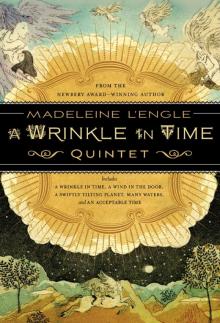 A Wrinkle in Time Quintet
A Wrinkle in Time Quintet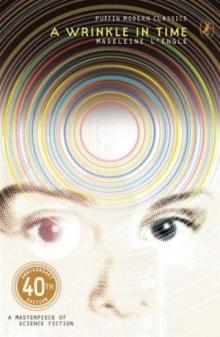 Wrinkle in Time
Wrinkle in Time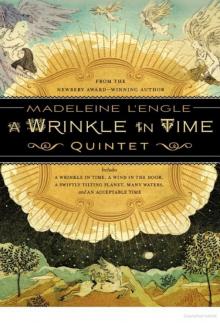 The Wrinkle in Time Quintet
The Wrinkle in Time Quintet Intergalactic P.S. 3
Intergalactic P.S. 3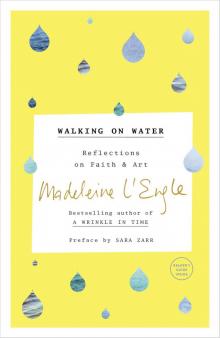 Walking on Water
Walking on Water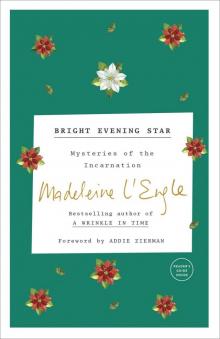 Bright Evening Star
Bright Evening Star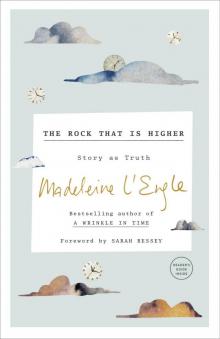 The Rock That Is Higher
The Rock That Is Higher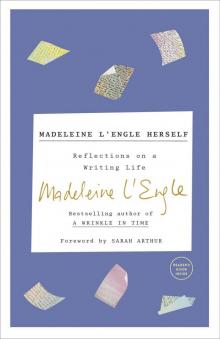 Madeleine L'Engle Herself
Madeleine L'Engle Herself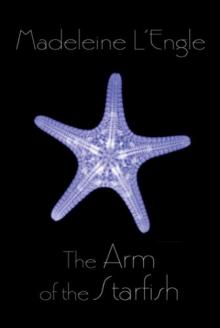 The Arm of the Starfish
The Arm of the Starfish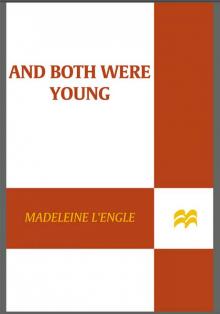 And Both Were Young
And Both Were Young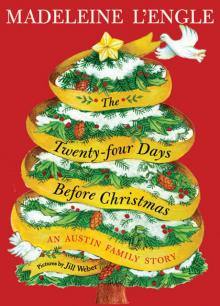 The Twenty-four Days Before Christmas
The Twenty-four Days Before Christmas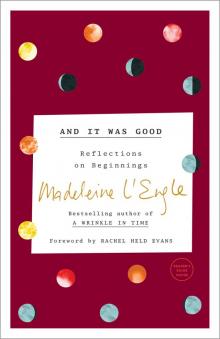 And It Was Good
And It Was Good A Stone for a Pillow
A Stone for a Pillow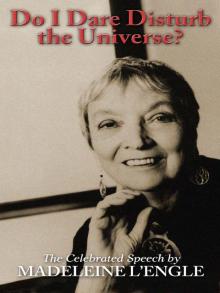 Do I Dare Disturb the Universe?
Do I Dare Disturb the Universe?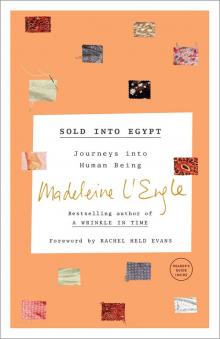 Sold into Egypt
Sold into Egypt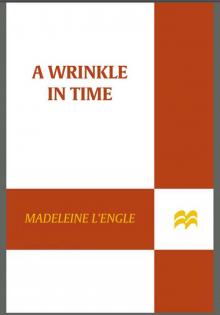 A Wrinkle in Time (Madeleine L'Engle's Time Quintet)
A Wrinkle in Time (Madeleine L'Engle's Time Quintet)